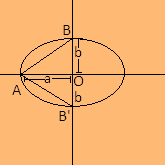Question
Question: If one end of the minor axis forms an equilateral triangle with the foci of the ellipse, then find t...
If one end of the minor axis forms an equilateral triangle with the foci of the ellipse, then find the eccentricity of the ellipse.
A.21
B.21
C.23
D.41
Solution
The major axis bisects the equilateral triangle in the middle and forms two right angled triangles. Take one right angled triangle and use Pythagoras theorem which states that , “In a right angled triangle, the square of the longest side (hypotenuse) is equal to the sum of the squares of the two other sides”
⇒ H2=P2+B2 Where H is hypotenuse, P is the perpendicular and B is the base, to find the side joining foci to one point of triangle formed on the minor axes. Then find the value of a and b and use the formula of eccentricity of ellipse which is given by-
Eccentricity of ellipse=1−a2b2 where a and b are half lengths of major and minor axes respectively.
Complete step-by-step answer:
Let BB’ be the end of the minor axis forming an equilateral triangleΔABB′ with foci A of the ellipse. Now we know that the length of major axes of ellipse is 2a and length of minor axes is 2b. Then, let O be the centre where the major axis and minor axes meet. So we get,
OA=a, OB=OB’=b as BB’=2b

Now since it is clear from the diagram ΔAOB′ is a right angled triangle where OA=’a’ and OB’=b.
We have to find AB’.
By Pythagoras theorem,
In a right angled triangle, the square of the longest side (hypotenuse) is equal to the sum of the squares of the two other sides. It is written as-
H2=P2+B2
Where H is hypotenuse, P is the perpendicular and B is the base.
Here AB’ is the hypotenuse, OB’ is the base and OA is the perpendicular. Then on putting the values in the formula we get,
⇒ AB′2=OB′2+OA2
On putting OA=’a’ and OB’=b, we get-
⇒AB′2=b2+a2
⇒AB′=b2+a2
Now we know that ΔABB′ is an equilateral triangle then, all the sides of given triangle are equal.
⇒ AB’=BB’
On putting the values we get,
⇒b2+a2=2b
On squaring both side we get,
⇒b2+a2=4b2
On simplifying we get,
⇒a2=4b2−b2
⇒a2=3b2
On taking the ratio ofa2b2 , we get-
⇒a2b2=31
Now we know that eccentricity of ellipse=1−a2b2
On putting the values we get,
Eccentricity of ellipse=1−31=33−1
On solving we get,
Eccentricity of ellipse=32
Note: Here, we have to find the values of ‘a’ and b to calculate the eccentricity of ellipse which is not easy to find. Hence we find the ratio of b/a by using the value of the sides of the equilateral triangle. Equilateral triangle is a triangle which has equal sides and equal angles which means AB= AB’=BB’. So the students can also take triangle AOB to use Pythagoras theorem and find the value of side AB.
On putting the values in the theorem-
⇒ AB2=OB2+OA2
⇒AB2=b2+a2
⇒AB=b2+a2
